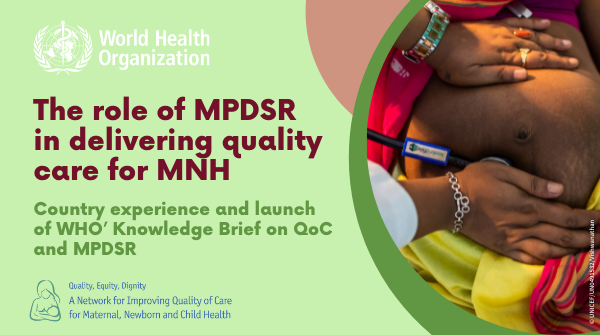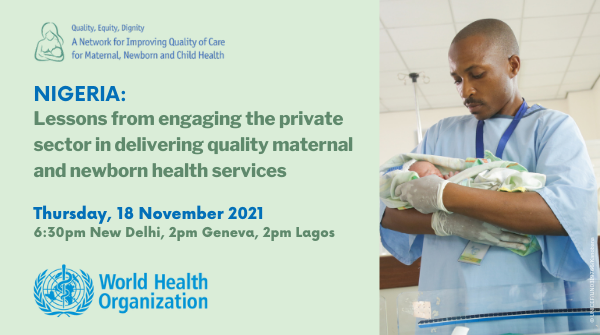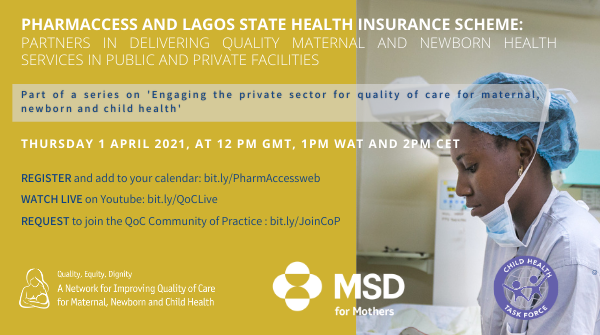Quality of Care in Nigeria
In 2018, the Federal Ministry of Health (FMOH) Nigeria established a national Maternal, Newborn and Child Health (MNCH) Quality Improvement Technical Working Group that initiated the development of a first-ever National Quality Strategy for Reproductive, Maternal, Newborn and Child Health (RMNCH). In 2020, this Strategy was utilized to inform the initiation of the development of the National Quality Policy and Strategy (NQPS). The developed Reproductive, Maternal, Newborn, Child, Adolescent and Elderly Health Plus Nutrition (RMNCAEH+N) implementation guide is being implemented across 113 health facilities in 12 states, which will be extended to 6 additional states.
Over recent years, Nigeria has sustained momentum at political and national level and developed supportive governance structures for Maternal, Newborn and Child Health (MNCH) quality of care to address the high burden of maternal and newborn morbidity and mortality. The coordination of quality of care implementation has been strengthened over the years within the Federal Ministry of Health (FMOH) and a growing number of partners have been successfully engaged to help accelerate progress to achieve maternal and newborn health goals.
In 2022, a National Implementation Guide for Reproductive, Maternal, Newborn, Child, Adolescent Health Quality of Care in Nigeria was developed. Additionally, the first National Reproductive, Maternal, Newborn, Child, Adolescent, Elderly Health plus Nutrition (RMNCAEH+N) Quality of Care Monitoring, Evaluation, Accountability, and Learning (MEAL) Plan (2022-2027) was launched. The Plan sets out a vision to establish a coordinated and effective national system for the tracking and management of strategic information on RMNCAEH+N quality of care. It aims to support the national vision to reduce maternal and newborn mortality, preventable deaths, stillbirths and improve elderly health plus nationwide nutrition improvement by 50% by 2027 and improve access to affordable care and ensure patient satisfaction. In support of these goals, a two-year costed RMNCAEH+N QoC Operational Plan (2021-2022) was developed. The National RMNCAEH+N QoC MEAL plan and implementation guide is an instrumental step to institutionalizing evidence-based decisions on health policy and for the allocation of scarce resources. The MEAL plan is being adapted at state level along with the development of a research framework.
National policy guidelines on comprehensive newborn care and Kangaroo Mother Care (KMC), family planning and sexual and reproductive health were launched in 2022. The adoption of the standards for improving the quality of care for small and sick newborns in health facilities, and standards for improving the quality of care for children and young adolescents in health facilities is also being taken forward in 2022.
Nigeria has scaled up the implementation of quality of care activities for MNCH to 6 additional of the 36 states in 2022, and plans are in place to support expansion to cover 6 additional states in 2023. Under the stewardship of the maternal and newborn health quality of care technical working group (TWG), quality improvement coaches, staff and quality of care officers are continuously trained, and on-site coaching visits are regularly occurring in the learning districts. During 2021, a quality of care activities tracker was developed to keep track of TWG’s priorities and activities and ensure quality of care is implemented adequately and at a good pace to achieve maternal, newborn and child health targets. Reproductive, Maternal, Newborn and Child Health (RMNCH) has been the pathfinder for quality care and Nigeria is now looking at beyond the RMNCH scope and adopting an integrated approach is being adopted at Primary Health Care level along the continuum of care.
As part of efforts to reduce maternal and newborn morbidity and mortality, a legislation for the effective surveillance, review, and prevention of maternal and perinatal deaths was passed in 2020. As maternal and perinatal death surveillance and response (MPDSR) is considered a strategic and evidence-based approach to improving the quality of maternal and newborn health, Nigeria aligned and integrated quality of care for MNCH and MPDSR structures at national, subnational and facility levels. Combined MPDSR and QoC committees were established at district and facility levels, and joint Monitoring & Evaluation and implementation plans for MPDSR and QoC for MNCH were developed. In 2022, Nigeria successfully incorporated child mortality audit into the maternal and perinatal death surveillance and response programme (MPCDSR). The implementation guidelines for QoC and MPCDSR proposed the National Steering Committee to coordinate implementation, thus there is plan for Joint National Steering Committee meeting that is chaired by the Honourable Minister of Health.
Plans are also underway to update Nigeria’s national Health Management Information System (HMIS) to include crucial indicators on RMNCAEH+N QoC and also address the disparities between the health facility registers and the DHIS2 system. In tandem, the FMOH is planning to establish a data and documentation center in house, which is well-resourced to cater for over 40,000 facilities across all states, given that the DHIS2 system in Nigeria is outsourced to a private company. Furthermore, efforts are underway to ensure all health facilities report on RMNCAEH+N QoC to the FMOH (currently only primary facilities are reporting via the routine system). A National MPCDSR e-Platform to enter, collate and analyze mortality and review data is in place. All secondary health facilities, 54 tertiary hospitals and primary healthcare centers are reporting on MPCDSR through this platform.
Private sector engagement to deliver quality MNCH has been a strong focus of work. Between 2020-2021, the Federal Ministry of Health and WHO Nigeria conducted a situational analysis to explore mechanisms for private health sector engagement to improve maternal and newborn outcomes. A multi-stakeholder workshop was convened in June 2021 to review and assess mechanisms for engaging the private sector in delivering MNCH services with quality and propose models for effective public- private partnerships for MNCH. Key recommendations from the Multi-stakeholder Dialogue were to strengthen government capacity to regulate and oversee the private sector, conduct capacity building, align structures and to share data collection tool and provide adequate health insurance tariffs for the private sector. It was also noted that the dissemination of health policies, strategies and plans to private sector providers, the participation of the private sector in health policy development are essential to continued strengthening of engagement. In 2022, Nigeria plans the implementation of private sector engagement mechanisms for MNCH QoC as a priority agenda to further stakeholder coordination at national level to develop a standardized and uniform approach to quality care. The implementation of MPCDSR will be extended to private health facilities in 2023.
In terms of learning and knowledge sharing, plans are in place to represent academic institutions in the National MNCH QoC Technical Working Group (TWG) and to engage at least one institution per learning zone to support implementation and operations of quality care research in 2022. The Technical Working Group will work in 2022 to determine learning questions across maternal, child, newborn and respectful maternity care. A national quality of care learning forum will be hosted in the final quarter of 2022, with the support of the MEAL Committee to share progress, challenges and lessons learned across learning facilities and districts along the quality of care journey.
Photo: A mother and her child wait to receive care at a UNICEF-supported mobile MNCH clinic in Farankasa village, Zamfara State, Nigeria. © UNICEF/Knowles-Coursin






